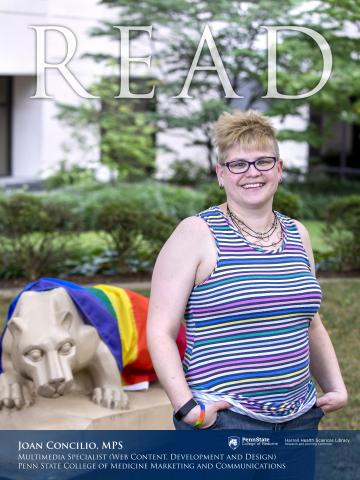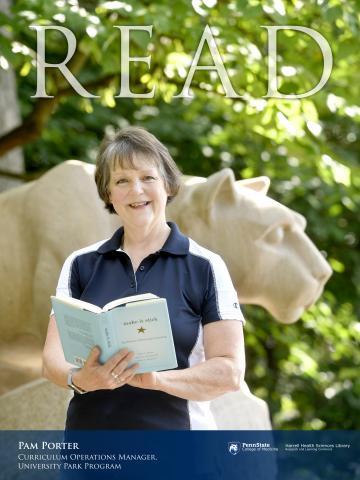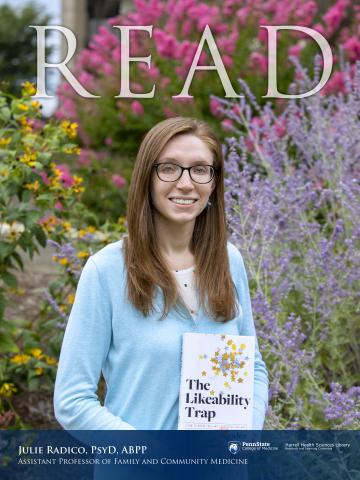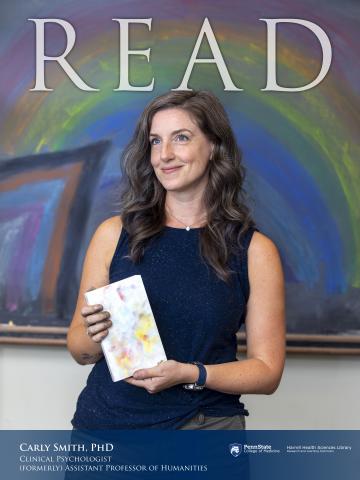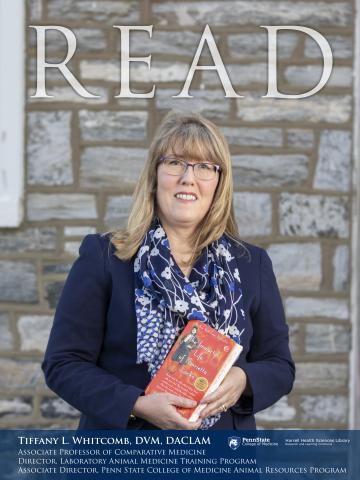Joan Concilio, MPS
Multimedia Specialist (Web Content, Development and Design)
Penn State College of Medicine Marketing and Communications
Love Lives Here: A Story of Thriving in a Transgender Family by Amanda Jette Knox
2020 has certainly been an eventful year, but in my family, it was 2019 that was life-changing. Within the first few months, I got married; my mother passed away; I finished my master's degree in homeland security/public health preparedness through World Campus and presented my capstone paper at a conference in Australia; and, on top of all that, both my 19-year-old and my new spouse began the process of gender transition.
I'm thrilled to have a wonderful son and wife, and support from so many of our family members, friends and coworkers has been amazing. But no one in my circles had both their kid and their partner transition, or dealt with quite so many wildly huge changes at the same time. Amanda Jette Knox, though, has walked in my shoes. Love Lives Here: A Story of Thriving in a Transgender Family is her look at what it's been like to support the transition of one of her children and of her wife, Zoe, but it's also a guide to how to deal with the kinds of changes you can't ever predict - which makes it an excellent read for everyone.
I've always thought that the best kinds of books are ones that make you feel like part of something larger than yourself, and that open you up to new ways of seeing the world. Loves Lives Here was exactly what I needed to feel less uncertain and alone. I'm grateful to have been selected as a READ honoree this year, but I'm even more grateful to Harrell Library and to the broader Penn State College of Medicine/Penn State Health community (especially the LGBTQ and Allies Affinity Group, which my wife, Kaitlyn, and I are both proud to be part of!) for their efforts to create a place where everyone is welcome. It means more than I can say.
Pam Porter
Curriculum Operations Manager, University Park Program
Make It Stick: The Science of Successful Learning by Peter C. Brown, Henry L. Roediger, Mark A. McDaniel
Three years ago I found myself in the position to be turned down for advancement with the words that I had heard before, “If you just had your master’s degree”. I had reached a certain stage in my life where it would have been easiest to just continue on the trajectory I was on. I was secretly unsure if I could return to the formal learning arena. This time I got enough courage to at least research the idea of getting a masters. While researching and consulting with colleagues, the book, Make It Stick: The Science of Successful Learning was suggested. Make It Stick addressed my fear of whether I still had the ability to “learn” in modern higher education. One of the most important takeaways for me was the idea of the “growth mindset” and the “more we do, the more we can do” (Brown et al, 2014, p. 199). I am proud to say that I decided to take the risk and begin a masters of education in Learning Design and Technology through Penn State World Campus. I will graduate in May 2021.
Harrell Library became part of my learning story. As I progressed through my courses, I attempted to examine learning design from the perspective of medical education. The Harrell librarians provided me with search techniques, how to use PubMed, open source resources, and training in EndNote and Mendeley. I appreciate the resources made available through our university library system and the support as I embraced the growth mindset needed to pursue my master’s degree.
Julie Radico, PsyD, ABPP
Assistant Professor of Family and Community Medicine
The Likeability Trap: How to Break Free and Succeed as You Are by Alicia Menendez
The Penn State Hershey Group on Women in Medicine and Science (GWIMS) has established a book collection in the Harrell Health Sciences Library. The books in this collection focus on issues faced by women in leadership and academic medicine. All are welcome to borrow these books from the library. Harrell Health Sciences Library staff have been instrumental in their contributions to GWIMS and in forming this collection. The library staff is comprised of professionals dedicated to providing an educational and supportive environment to empower all in the PSU Hershey community. They are a pleasure to collaborate with and are a true asset to our organization.
The Likeability Trap is one of the books in the GWIMS library collection. Ms. Menendez writes about the impossible dichotomy career women face in trying to be likeable and assertive, which often leaves women stuck at lower levels of leadership. This is may contribute to the “leaky pipeline” of women leadership in academic medicine. According to the AAMC 2018-2019 State of Women in Academic Medicine report women make up 41% of full-time faculty however are only 18% of all department chairs. Ms. Menendez shares strategies to consider in navigating the likeability trap. Similar issues are discussed in GWIMS meetings, which are focused on empowering and supporting women in our Penn State community. I encourage those facing these challenges and allies of women to consider checking out the GWIMS library collection and a GWIMS meeting.
Carly Smith, Ph.D.
Clinical Psychologist
(formerly) Assistant Professor of Humanities
Salt by Nayyirah Waheed
"Some words build houses in your throat. and they live there. content and on fire." This is an entire poem in salt. by Nayyirah Waheed and even in these few words, she manages to evoke a complicated emotion but also make it beautiful. I have never been so moved by a collection of poetry. I suspect that this is because Waheed writes about topics that are rarely spoken about, much less handled lovingly - trauma, bisexuality, grief, the African Diaspora, gendered violence, and divine femininity. Her poems often spring fully to mind just when I need them - helping a patient understand their own resilience, looking for my own strength, or falling in (or out) of love.
Tiffany L. Whitcomb, DVM, DACLAM
Associate Professor of Comparative Medicine
Director, Laboratory Animal Medicine Training Program
Associate Director, Penn State College of Medicine Animal Resources Program
The Immortal Life of Henrietta Lacks by Rebecca Skloot
I had the pleasure of hearing author Rebecca Skloot discuss her book, The Immortal Life of Henrietta Lacks, at a conference in 2016. As I listened to her talk, memories of working with cells in petri dishes during my undergraduate training came to mind. I remembered learning how to take care of HeLa cells and remembered appreciating all the incredible advancements that grew from their existence (Polio vaccines, treatments for cancer and AIDs, to name a few). What I didn’t know was the name of the woman the cells came from (Henrietta Lacks). I also had no idea that the cells were taken without her permission during the biopsy of a tumor that would shortly take her life. Nor did I know that the Lacks family received no benefit from the resulting multibillion- dollar global industry producing Henrietta’s cells for sale to laboratories.
Rebecca Skloot performed 10 years of meticulous research to reassemble a historically accurate picture of medicine in the 1950s. This was a time before informed research consent was required and when hospitals would segregate or refuse to treat Black patients, like Henrietta. I admire and respect the way the author took the time to get to know the Lacks’ as a family. In return, the Lacks family generously allow us to know Henrietta Lacks as a woman, before she was a patient, and before her cervical cancer cells were transformed into one of the most powerful medical research tools available to science today. The Immortal Life of Henrietta Lacks is a clear reminder of the reasons we now have ethics boards that review all research proposals. The hours that we spend writing research protocols and working with ethics committees are precious and vital to preventing the kind of harm that came to Henrietta and her family.
Until I started my position at the College of Medicine over a decade ago, I did not understand the important role that librarians play in medical ethics, and social responsibility. I have gained a deep admiration for the librarians who support our Institutional Animal Care and Use Committee by skillfully helping researchers perform the legally required searches for alternatives to using animals. I have come to realize that not only are librarians a resource for literature searches, but they are the defenders of our intellectual freedom, our privacy, and our access to information. Librarians are an integral part of the reason that we have access to transformative stories, like the one about Henrietta Lacks.
